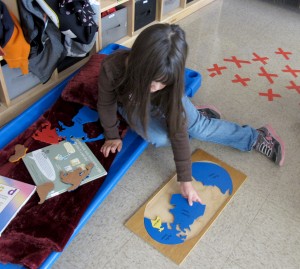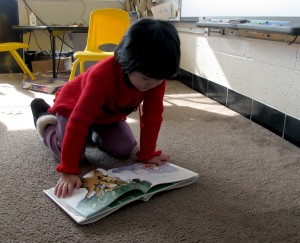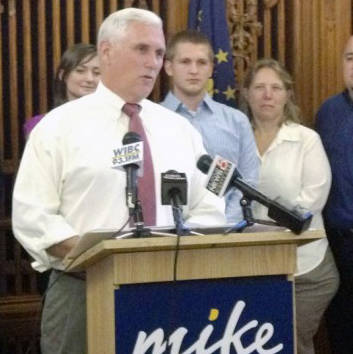After Voters Reject Preschool Referendum, Columbus Must Take Different Approach

Elle Moxley / StateImpact Indiana
A student works on a map puzzle at Busy Bees Academy, a public preschool in Columbus, Ind.
The Columbus preschool program Governor-elect Mike Pence praised on the campaign trail will have to scale back services next year after voters rejected a referendum to pay for early education.
“We had hoped to pass a referendum and have a lot of funding for that,” says John Quick, superintendent of Bartholomew Consolidated School Corporation. “That didn’t work, but that didn’t mean the need went away.”
The push to enroll more kids in preschool began about four years ago. The school district partnered with the Community Education Coalition to create Busy Bees Academy, an all-day pre-kindergarten program for 4-year-olds. More than 350 families applied for 180 spots last year, and the school district had to use a lottery system to assign kids to the preschool.
But without the referendum, the district won’t be able to expand the program. They’ve had to cut a day of classes each week from next year’s calendar and eliminate a scholarship program that allowed low-income students to attend Busy Bees for just $5 a week.
Instead, families will pay $90 a week to send their kids for a full day of preschool at Busy Bees or $45 for a half day. Low-income students at the district’s three Title I schools — Clifty Creek, Schmitt and Taylorsville — will be able to attend a federally-funded pre-kindergarten program four days a week. That program costs $4 to 12 per week, depending on family income, and lasts half a day.“So at those three schools, school essentially starts at 4,” says Quick.
Indiana is one of 11 states that doesn’t fund an early education program, though a handful of communities including Columbus have their own publicly funded option. Indianapolis Public Schools is launching a pre-kindergarten initiative next year.
But while Columbus still wants to increase the number of students enrolled in pre-kindergarten, without public dollars Community Education Coalition President John Burnett says he’s worried some students will slip through the cracks. His organization is committing about $150,000 to Busy Bees next year and will provide mid-day transportation to students, a major barrier to attending preschool for many families.
“Unfortunately what that means is the scholarship money we were going to be providing to the private, faith-based providers, we’re having to reallocate back into BCSC,” says Burnett.

Elle Moxley / StateImpact Indiana
A student at Busy Bees Academy, a public preschool in Columbus, Ind., reads before nap time.
A key component of the citywide preschool initiative had been providing scholarships to other preschools for 75 students each year. But there’s not enough money to pay for both the scholarships and programming at Busy Bees.
Superintendent Quick sees a silver lining, though. Even though the district has had to cut days, he hopes that giving families a half-day option will allow more students to attend next year.
He’s also optimistic this year legislators will get serious about putting state money into pre-kindergarten. House Ways and Means Chairman Tim Brown told Indiana Public Broadcasting‘s Steve Walsh on Monday that finding funding for early education was a priority.
“What can we do in grants, and what innovative programs do school corporations have that will apply for grants?” he asked.
That’s good news for Quick. Governor-elect Pence has called Columbus’ approach a “pilot” for the state.
“Certainly some incentive dollars would be great. … The state could chip in some money, parents could chip in some money — you know, like we used to at kindergarten at one time,” Quick says.

